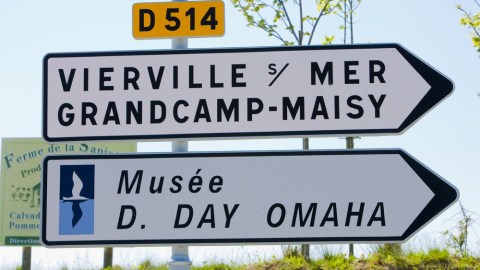Though Relatively Few Remain, D-Day Vets Remember The Great Crusade

What’s the Latest?
Today is the 70th anniversary of the Allied invasion at Normandy. While the number of veterans and survivors of the momentous occasion continues to shrink year after year, concerted efforts are being made by both the young and old the commemorate the anniversary.
Jim “Pee Wee” Martin, a veteran of the U.S. 101st Airborne Division, parachuted into Normandy today much in the same way he did seventy years prior. The 93-year-old Martin explained that, despite his age, this jump was a lot easier than his last. “There wasn’t anybody shooting at me today,” he said.
The Chicago Tribune has a feature today on a pair of 89-year-old D-Day vets, medic Hank Rossetti and Army Air Force gunner John Kraeger.
Matthew Czajka, a 98-year-old veteran from Newton, Connecticut, remembers his experiences landing with the rest of the 110th AAA Gun Battalion.
The Winnipeg Free Press features an article on 93-year-old Canadian vet John Ross.
The Daily Mail profiles seven Australian vets who journeyed to Normandy for the commemorative ceremonies.
Finally, The Guardian explains why this D-Day ceremony will be the last for Britain’s Normandy vets
There is one notable constant throughout these articles: this may be our last opportunity to celebrate a round-number D-Day anniversary in the presence of the men and women who served.
What’s the Big Idea?
The Guardian piece describes how the British Normandy Vets’ Association plans to disband in November, “as age defeats its ranks.” As World War II vets reach their late 80s and early 90s, our living connection to the massive conflict approaches its inevitable end.
According to the U.S. Department of Veteran Affairs, only about 15 million of the 16 million Americans to serve in World War II remain alive today, with an estimated 413 additional vets dying each day. Factor in living veterans from the rest of the combatant nations, one can estimate that perhaps fewer than 10 million remain. It is doubtful that half that many will live to see D-Day’s 80th anniversary.
Florence Green, an English woman who died in 2012 at the age of 110, was the last remaining World War I veteran. Her passing was symbolic — a break in the chain, the plunging of the First World War out of living memory and into the realms of modern antiquity. We can assume the last of the World War II vets will remain with us for about 20 years, but what happens when they’re gone? How will we remember World War II in the future? For now, all we can do is cherish the memories and stories of our living vets.
Read more about Jim Martin recreating his jump at CNN
Read about Rossetti & Kraeger at The Chicago Tribune, Czajka at The News Times, Ross at The Winnipeg Free Press, and the Aussies atThe Daily Mail.
Read about the Normandy Veterans’ Association at The Guardian.
Photo credit: PHB.cz (Richard Semik)/Shutterstock





